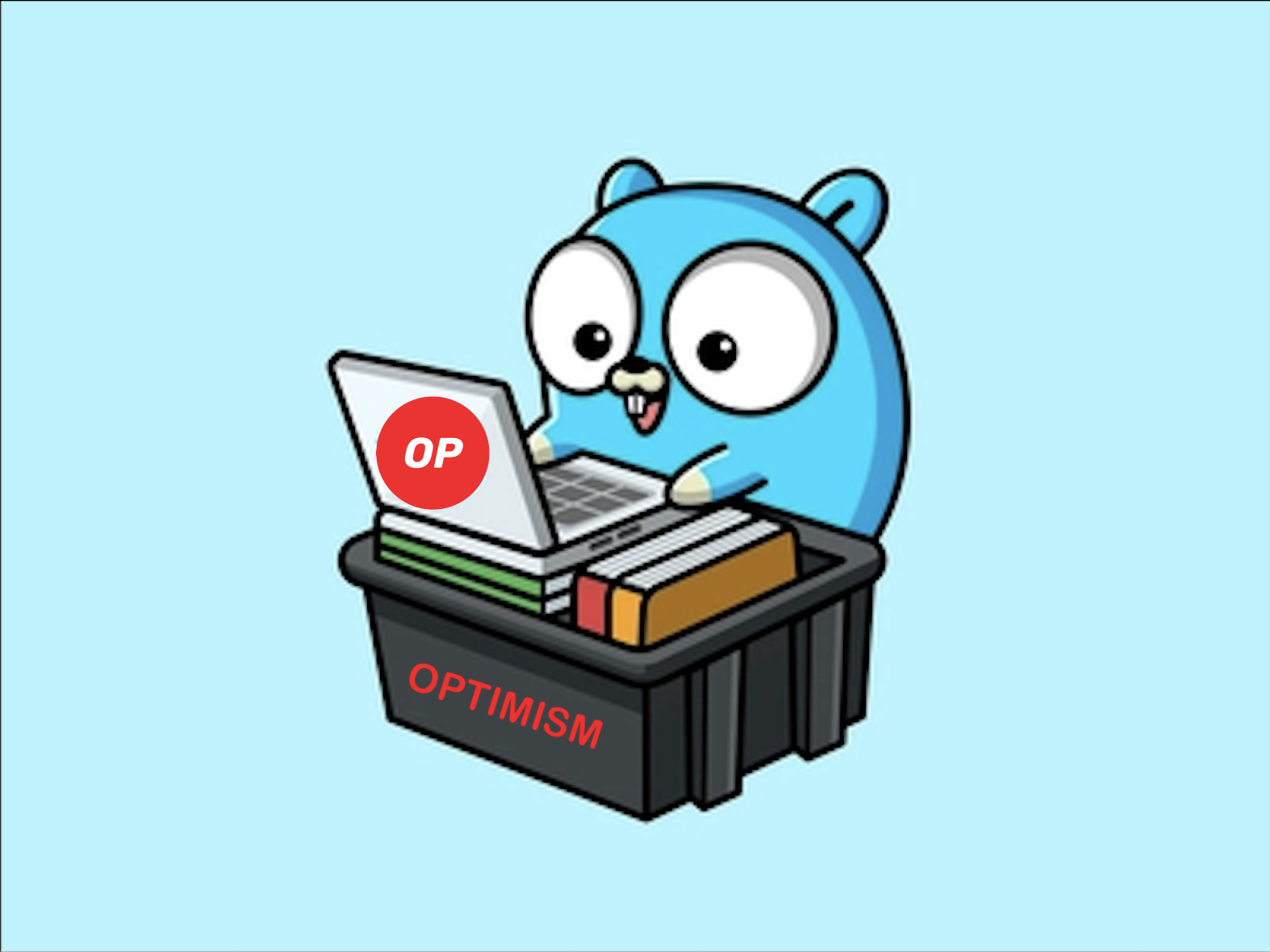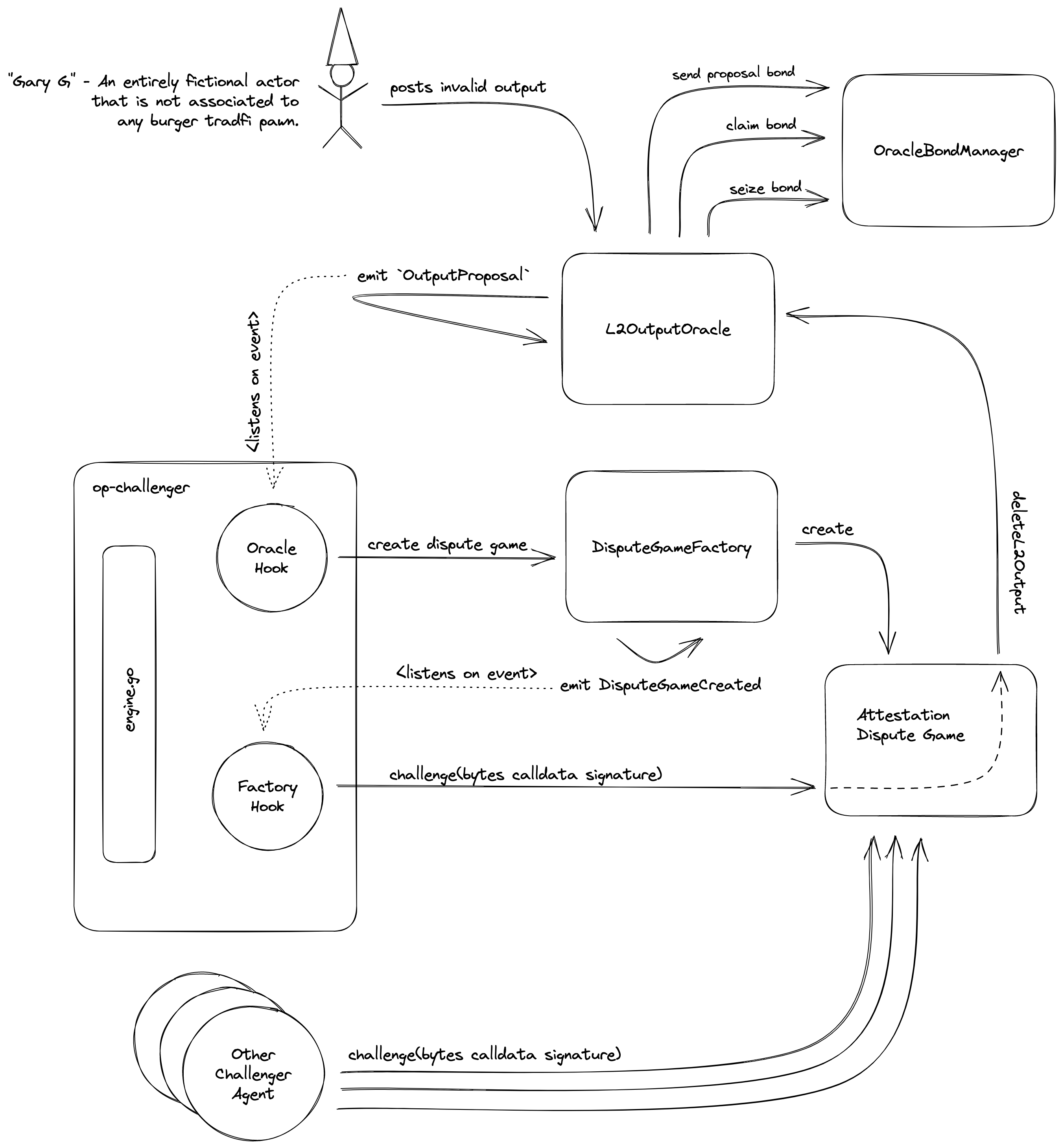A modular op-stack challenge agent for attestation (fault and validity soon™) dispute games written in golang. Please note this is a proof of concept not intended for production use. The authors of this repository expressely recommond following the rust-based op-challenger for performance.
First, clone the Optimism Monorepo and set the MONOREPO_DIR environment variable to the path of that directory in a .env file as shown in .env.example.
Then, you can simply run make, which will compile all solidity + golang sources, bring up the Optimism devnet while also deploying the mock dispute game contracts, and then run the op-challenger.
Alternatively, you can build the op-challenger binary locally using the pre-configured makefile target by running make build, and then running ./op-challenger --help to see the available options.
In the future, we intend to support downloading the op-challenger binary from challenger.refcell.org using curl -s https://challenger.refcell.org | sh
op-challenger is configurable via command line flags and environment variables. The help menu shows the available config options and can be accessed by running ./op-challenger --help.
Note that there are many global options, but the most important ones are:
OP_CHALLENGER_L1_ETH_RPC: An L1 Ethereum RPC URLOP_CHALLENGER_ROLLUP_RPC: A Rollup Node RPC URLOP_CHALLENGER_L2OO_ADDRESS: The L2OutputOracle Contract AddressOP_CHALLENGER_DGF_ADDRESS: Dispute Game Factory Contract AddressOP_CHALLENGER_PRIVATE_KEY: The Private Key of the account that will be used to send challenge transactionsOP_CHALLENGER_L2_CHAIN_ID: The chain id of the L2 network
Here is a reduced output from running ./op-challenger --help:
NAME:
op-challenger - Modular Challenger Agent
USAGE:
main [global options] command [command options] [arguments...]
VERSION:
1.0.0
DESCRIPTION:
A modular op-stack challenge agent for output dispute games written in golang.
COMMANDS:
help, h Shows a list of commands or help for one command
GLOBAL OPTIONS:
--l1-eth-rpc value HTTP provider URL for L1. [$OP_CHALLENGER_L1_ETH_RPC]
--rollup-rpc value HTTP provider URL for the rollup node. [$OP_CHALLENGER_ROLLUP_RPC]
--l2oo-address value Address of the L2OutputOracle contract. [$OP_CHALLENGER_L2OO_ADDRESS]
--dgf-address value Address of the DisputeGameFactory contract. [$OP_CHALLENGER_DGF_ADDRESS]
--private-key value The private key to use with the service. Must not be used with mnemonic. [$OP_CHALLENGER_PRIVATE_KEY]
...
--help, -h show help
--version, -v print the versionThe op-challenger is a challenge agent for the output dispute game. It is responsible for challenging output roots.
This implementation is loosely based off the op-proposer, a proposer agent that is responsible for proposing new outputs to the L2OutputOracle. And this should make sense; where the op-proposer posts outputs to the L2OutputOracle, the op-challenger validates these outputs and disputes them if invalid. The primary functional difference the op-challenger must implement is the ability to challenge invalid outputs.
The naive challenge agent will be an attestation challenger which is a permissioned set of actors running the op-challenger. Below we illustrate how the challenger agent interacts with the op-stack's permissionless output proposal system.
The next iteration of the challenge agent will use fault proofs to challenge invalid outputs. This will involve a more complex dispute game which will allow for permissionless challengers by attaching bonds to each level of the dispute game. A future iteration could allow for validity (zero-knowledge) proofs.
See CONTRIBUTING.md
MIT, forever and always.
- op-challenger: a rust challenge agent 🦀
- optimism: the optimism monorepo 🚀
- op-stack: the op-stack 🥳



